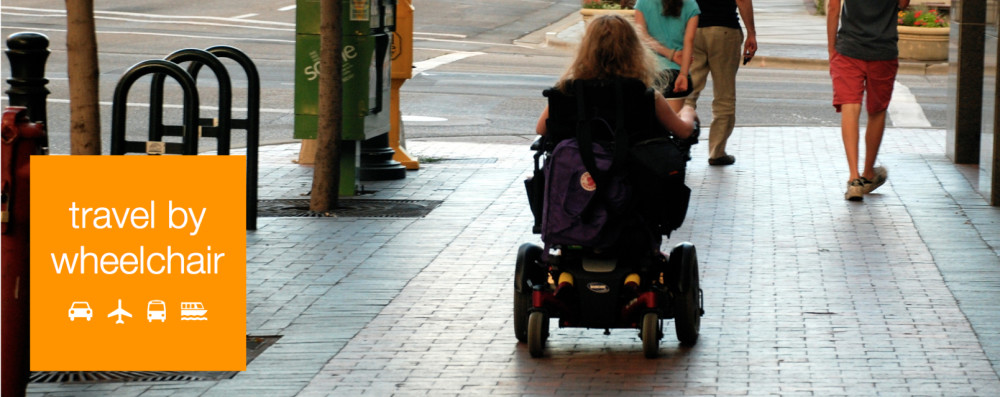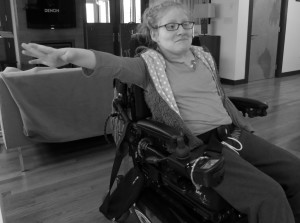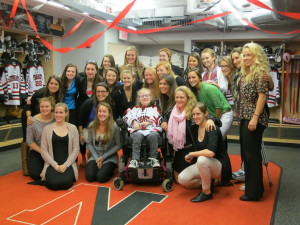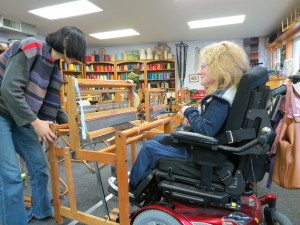 Our SAORI teacher sounds a lot like Marianne’s yoga guru (Diane of Sitwithyoga.com.) Yoga teaches the power of repetition to center a busy mind: Sa, Ta, Na, Ma. Mihoko introduces us to the SAORI mantra: slide, switch, pull. There is something undeniably meditative about this contemporary, Zen-based, art form from Japan. SAORI weaving is a truly accessible art.
Our SAORI teacher sounds a lot like Marianne’s yoga guru (Diane of Sitwithyoga.com.) Yoga teaches the power of repetition to center a busy mind: Sa, Ta, Na, Ma. Mihoko introduces us to the SAORI mantra: slide, switch, pull. There is something undeniably meditative about this contemporary, Zen-based, art form from Japan. SAORI weaving is a truly accessible art. 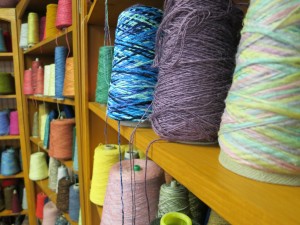 Slide, switch, pull, we murmur to ourselves, as we thread our soft and silky, sometimes scratchy, yarns on the loom. Spools of varying hues and textures surround us on bookshelves and in baskets. We sit immersed at our shuttles, while the bobbin gently thrums and thwaps, and the wooden frame clicks. Silenced for two hours, we are wrapped in our cocoons of texture, sound and color. Sometimes, a happy choice must be made; we rise to choose from the shelves or pick from the basket at our side. Shiny red cotton, a bumpy nub of mossy-green wool, or a surprise texture like the twig we found on the pathway or the discarded bit of orange twine? Back to work…..and to create.
Slide, switch, pull, we murmur to ourselves, as we thread our soft and silky, sometimes scratchy, yarns on the loom. Spools of varying hues and textures surround us on bookshelves and in baskets. We sit immersed at our shuttles, while the bobbin gently thrums and thwaps, and the wooden frame clicks. Silenced for two hours, we are wrapped in our cocoons of texture, sound and color. Sometimes, a happy choice must be made; we rise to choose from the shelves or pick from the basket at our side. Shiny red cotton, a bumpy nub of mossy-green wool, or a surprise texture like the twig we found on the pathway or the discarded bit of orange twine? Back to work…..and to create. 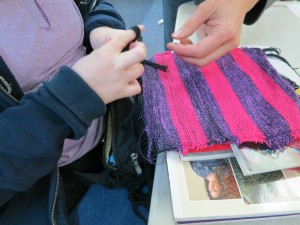 Marianne, her friend and I spent a companionably quiet morning in this still workshop in Worcester, learning to weave, following our own artistic imperative, being at peace. SAORI looms are adapted to make it possible for people with physical disabilities to weave, and there is something so centering about this experience that I imagine it would benefit those of us with ADHD or sensory integration challenges too. . “A mistake is a happy accident” says Mihoko, and in fact, practitioners of SAORI weaving welcome the unexpected. Which many of us who live with different abilities can tell you is a good thing: things don’t always turn out the way one expects if your hands aren’t following your brain’s orders, or you’re doing a two-handed skill with one hand, or you were too distracted to listen to more than one or two steps of the directions.
Marianne, her friend and I spent a companionably quiet morning in this still workshop in Worcester, learning to weave, following our own artistic imperative, being at peace. SAORI looms are adapted to make it possible for people with physical disabilities to weave, and there is something so centering about this experience that I imagine it would benefit those of us with ADHD or sensory integration challenges too. . “A mistake is a happy accident” says Mihoko, and in fact, practitioners of SAORI weaving welcome the unexpected. Which many of us who live with different abilities can tell you is a good thing: things don’t always turn out the way one expects if your hands aren’t following your brain’s orders, or you’re doing a two-handed skill with one hand, or you were too distracted to listen to more than one or two steps of the directions. 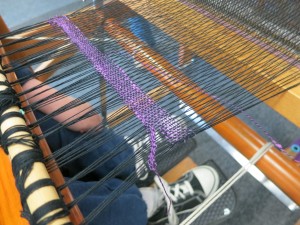 Saori Worcester is a wheelchair-accessible venue. Mihoko teaches trial classes or you can sign up for a basic course (6 weeks) or advanced (12 weeks). Class times vary. Pre-registration is required. Whether you’re product-oriented (think clothes, bags, toys, cushions) or about the flow, it’s worth a try. And a shout-out to Janelle and Sato, who told us about it in the first place!
Saori Worcester is a wheelchair-accessible venue. Mihoko teaches trial classes or you can sign up for a basic course (6 weeks) or advanced (12 weeks). Class times vary. Pre-registration is required. Whether you’re product-oriented (think clothes, bags, toys, cushions) or about the flow, it’s worth a try. And a shout-out to Janelle and Sato, who told us about it in the first place!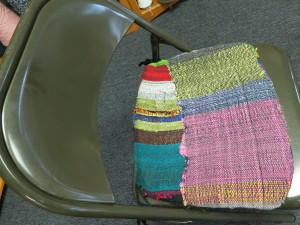
Category Archives: youth programs
Wheelchair yoga lessons
Sa Ta Na Ma. Sa Ta Na Ma. Sa Ta Na Ma.
Marianne repeated these beautiful words after Diane in our chair yoga class yesterday.
Birth, Life, Death, Rebirth. A mantra meant to remind yoga practitioners of the cyclical nature of life and of our breath. A tool to focus our mind on our breathing. Deeply relaxing. You can sit in a wheelchair or on a yoga mat and steady your breath and your mind.
Diane, a yoga teacher from Newton, MA, has recently started a practice called Sit With Yoga. She brings her practice to seniors citizens, and now, to us too . Chair yoga is accessible to all, not just the twisty-bendy types in the yoga studios.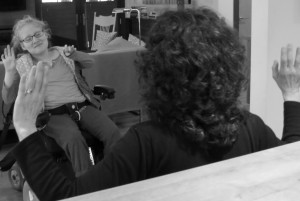
Marianne learned the very basic history of yoga, first, that it started over 5,000 years ago in India by monks who were meditating to still their minds. Because they found it hard to sit still for so long, the monks added body poses as a way to further focus their minds. B.K.S Iyengar, in India, took the poses further and added the concepts of alignment as a way to strengthen his own body and powers of focus.
Lions’ breath, cat and cow pose, namaste, twists, shavasana, and my favorite, goddess pose. All poses I’ve done on my mat in yoga class, and all poses that can be done in your wheelchair or chair.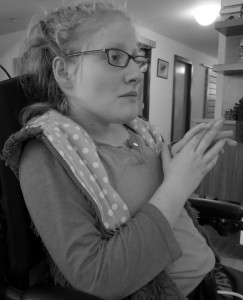
Namaste means “the light within me salutes the light within you.” It’s how we end our chair yoga class. Thank you, Diane, for this gift of yoga and accessibility on a snowy, cold January afternoon.
Trip Interrupted: Mad River Barn in VT will have to wait, unless you get there first…
Although a major snowstorm on a Thursday night after December break means an extended school vacation, we were sorry to miss out on our weekend in Waitsfield, VT at the Mad River Barn.
This B&B in Waitsfield, VT was recently bought and renovated – complete with a wheelchair-accessible room and bath, which we were hoping to review this weekend. Even better, the inn is very close to Sugarbush and the Vermont Adaptive Ski & Sports program at Mt. Ellen, and a much more affordable option than the Sugarbush Resort. The inn has a restaurant, pub and game room and is in the heart of Mad River Glen – a great location for a long weekend away from Boston. I spoke at length with Heather, the owner, who spent a lot of time with me on the phone and was then more than understanding when we had to cancel at the last minute due to inclement weather. (Getting stranded in a snowstorm with a teenager in a wheelchair is an experience I hope never to have!)
We’ll re-schedule our stay there but if you go before me, please post on TravelByWheelchair’s FB page!
Boston University’s “Project Team” is recruiting for their spring program
The barrier could be as simple as getting through a crowded room using a wheelchair or as complex as getting across a crowded city street using a wheelchair, using public transportation (using that same wheelchair) and navigating to the counter of popular city coffee bar to order your favorite cup of joe.
Whether the barriers are (seemingly) simple or obviously complicated, people with disabilities (those who use wheelchairs or those who don’t), face barriers in their everyday environment that many of us who do not have the same disabilities do not recognize as barriers. And that’s okay – as long as we listen when we are informed of the barriers and move to action to help eradicate said barriers.
My daughter Marianne recently participated in a program, called Project Team, that was designed to help people with disabilities advocate for the removal of barriers they encounter in their daily lives.
Project Team was developed by Jessica Kramer and her team at the Boston University Department of Occupational Therapy to work with young people with intellectual or physical disabilities to name barriers in their environment that keep them from reaching their goals and to be proactive in making changes so that the barriers are removed. The participants, aged 14 to 21, meet twice weekly for 8 weeks with peer mentors and team leaders to name barriers that they confront and to create game plans to change the environment. The goal is for these young people to learn to externalize challenges so that the obstacles can be removed – rather than simply giving up on one’s goals because it’s easier.
Marianne, who is 14 and uses a wheelchair, participated in Project Team this fall in Newton, and let me assure you, she is using her newly-developed advocacy skills daily!
There will be a group running in the Dedham/Sharon area after the February public school break, and if you are a young adult with developmental disabilities or know one who could benefit, please contact Jessica Kramer to find out more information. Both Marianne and I recommend Project Team highly.
Click here for more information on the spring recruitment: Recruitment Flyer_Trainee_v1.1
A program with a real impact
It was serendipity. Marianne and I heard a presentation by a local organization called Team Impact at an event we attended last spring. It sounded like a good idea: matching up young people with life-threatening illnesses or significant physical challenges with a college team for the season, so I filed it away in my mental “maybe some day” list. I sat on the idea for months, and then this past August, after some hemming and hawing, I placed a call to Erin MacNeil at Team Impact. She called me back almost immediately – they had a team, Marianne would be a great fit, all good!
Wow, that was fast. The mother in me was uncertain, because in my experience, almost nothing is easy if it involves accessibility.
Except…. maybe this. From the first, Marianne connected with Kelly, the team ambassador and senior player on the Northeastern University Women’s Hockey team, via email. The Huskie team put together a moving draft day experience.
The team brings Marianne into the locker room in between periods for pep talks. The young women are all FaceBook friends with Marianne, and she calls in on their away games. We just had the team, complete with coaches, to our house for a home-cooked meal and a chance to get to know each other better. Karaoke happened! This is the real thing; I can relax and know that Marianne is in good hands.
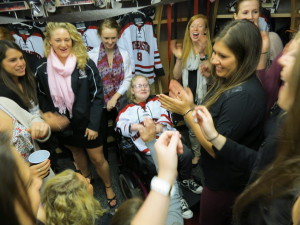 Watching Marianne interact with the team, I can’t help but know that she is gift to them, too. Our connections are what sustain us, and what makes our lives meaningful. Applause to Team Impact for bringing inspiring people together to be team.
Watching Marianne interact with the team, I can’t help but know that she is gift to them, too. Our connections are what sustain us, and what makes our lives meaningful. Applause to Team Impact for bringing inspiring people together to be team.
And one more thing: Go Huskies!!
